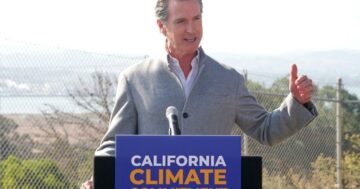
Now that the approximately 10,000 official delegates and 100,000 observers (saturated with side events and selfies) have recovered and reflected on the COP28 climate negotiations in Dubai last month, the debate is on whether the two-week session was a success or failure, or a little of both. Similar questions have arisen following parallel negotiations to solve the growing problem of global plastic waste and declining levels of biodiversity.
For climate change and biodiversity, international negotiations were authorized at the 1992 Earth Summit in Rio de Janeiro and have convened COPs continuously across the decades. Efforts to draft a global plastic waste agreement were authorized in 2022 with a goal of having a completed treaty by the end of 2024.
The supreme dilemma of these negotiations — each managed under the auspices of the United Nations — is that the longer they last, the worse the underlying problems they are aiming to solve have become. The dramatic degradation in environmental quality from these three global-scale problems in recent decades, and the common characteristics of the U.N. processes they follow, warrant closer examination.
There are several root causes of the inability of the global negotiating processes to even slow down the rate of environmental deterioration.
- The U.N. model favors least-common-denominator “consensus” responses and numerous opportunities to game the decision-making process. By requiring a “consensus” before the adoption of a negotiating outcome, COPs enable individual delegations to block policy or other changes and thus favor interests seeking to maintain the status quo. By contrast, a “majority” approach would enable a full airing of differing points of view and supporting evidence, and facilitate coalition-building, while reaching closure on important questions. Other U.N. bodies, such as the General Assembly, rely on decision-making by majority. Majority votes are not always correct, but they represent the best method to reconcile efficiency and effectiveness in the quest for results. Meanwhile, under the consensus approach, the planet burns, plastic waste accumulates in the oceans and food chains, and species are rapidly disappearing.
- The interests of stakeholders and observers have superseded the ability of official delegates to negotiate agreements. In 1992, when both the climate and biodiversity talks were authorized at the Rio Earth Summit, U.N. representatives were especially cognizant of the need for subsequent negotiating processes to be legitimate in the eyes of the global community. They adopted, therefore, a provision in which “any body…which is qualified…and which has informed the secretariat of its wish to be represented at a session of the Conference of the Parties as an observer, may be so admitted…” The upsurge in the number of observers and stakeholders have multiplied the number of conflicting agendas, created a massive social media echo chamber, and impeded the ability of official negotiators to produce a sustained focus on critical issues. Instead, they devote significant time to managing the growing crescendo of expectations (not always relevant to the official discussions) before, during and after formal sessions.
- COPs have increasingly become platforms for corporate branding campaigns, networking and global disinformation. While every global negotiation of consequence has its theatrical aspects, COP organizers are particularly ill-suited to managing the scale of such activities or policing information sources that seek to promote greenwashing or undermine specific discussions in the official talks. Nor should COP managers be responsible for facilitating the promotion of commercial and reputational interests of corporations, non-governmental organizations or universities. In describing COP28 as a “circus,” Harvard economist Robert Stavins provided his personal estimate that “10 percent of meaningful actions [occurred] within the negotiations and 90 percent among the myriad events…among participants of civil society.” By contrast, his observation of his first COP 16 years earlier was that “90-95 percent of the meaningful action was in the negotiations, with 5-10 percent among the participants from civil society.” Under any scenario, the shift that Stavins describes is a dysfunctional outcome.
The supreme dilemma of these negotiations — each managed under the auspices of the United Nations — is that the longer they last, the worse the underlying problems they are aiming to solve have become.
Several strategies can correct these imbalances and better align negotiating processes with the need for more meaningful results.
- Mobilize geopolitics to generate political momentum for specific negotiating objectives. For climate change, the China-U.S. relationship is the key political asset to achieve breakthrough outcomes. This was true in Paris when President Barack Obama and Chinese Premier Wen Jiabao agreed on the goal of limiting future temperature increases to 1.5 degrees Celsius. The Nov. 15 resumption of presidential-level bilateral talks empowered U.S. climate negotiator John Kerry and his counterpart Xie Zhenhua to announce a major Chinese commitment to curb methane and other greenhouse gases by 2035. This and other bilateral agreements can provide the engine to politically incentivize other sovereign nations, regional blocs and specific industry sectors to commit to major greenhouse gas reductions across their economies. Plastic waste and biodiversity negotiations will necessarily require a different cast of nations that will catalyze other sovereign states and industry groups to align themselves with progress. For example, major petrochemical producers, such as Saudi Arabia and the United Arab Emirates, that are attempting to transition their economies can play a leading role in developing global plastics solutions. Similarly, nations such as Brazil and Indonesia are critical geopolitical players in devising effective biodiversity protections. These nations, in concert with the EU, U.S. and through a “majority” vote U.N. process, can provide policy focus and political momentum to reducing these systemic global risks.
- Focus global negotiations initially on the highest emitters and waste producers. Trying to obtain meaningful consensus among 190-plus nations has proven to be a self-defeating proposition. Instead, global negotiations on climate, plastic waste and biodiversity should focus on the top 20-30 polluting nations whose agreement is most critical to leveraging success for the remainder of the world. For example, if the 20-30 largest GHG-emitting nations were to bargain and reach agreement for specific GHG reduction goals, timetables, transparency, financing and related issues — followed by a subsequent fuller airing of these commitments involving 190 nations, including observers and stakeholders — would significantly tilt the odds of a broader buy-in if a majority rather than consensus process were applied.
- Develop more stringent guidelines for selecting hosts and chairs of global negotiations. Currently, five regional groups (including Africa, Asia-Pacific and Eastern Europe) rotate hosting responsibilities. Nations within a regional group consult and decide which of its members will host/chair a COP meeting. There is widespread agreement among nations and stakeholders that participation of industry sectors is critical to success in protecting biodiversity resources, reducing plastic waste and ameliorating climate change. The overlap between representation of business interests and the governance of international negotiations, however, requires clearer separation. The selection of the CEO of the UAE’s national oil company to chair COP28 for example, created both the perception and the reality of material conflicts of interest. A similar dilemma has been created by Azerbaijan’s selection of a former oil and gas executive to chair the COP29 session in Baku later this year. Conflicts of this type need to be assiduously avoided in the future by the publication of more stringent U.N. guidelines for choosing future hosts and chairs of international environmental negotiations. Economically self-interested parties should also not have disproportionate influence over options that delegations consider.
International environmental negotiations are one of the most difficult undertakings facing modern society. Such talks, in recent years, have become even more challenging to manage in the face of deteriorating trust among those nation-states that most adversely impact the planet. Negotiations that are based on improving science and economic analysis, greater transparency and expanded stakeholder input are necessary, but not sufficient, conditions for reversing rapidly deteriorating environmental quality. It’s time to embrace alternatives to current negotiating processes. Nothing less than the future of the planet is at stake.
- SEO Powered Content & PR Distribution. Get Amplified Today.
- PlatoData.Network Vertical Generative Ai. Empower Yourself. Access Here.
- PlatoAiStream. Web3 Intelligence. Knowledge Amplified. Access Here.
- PlatoESG. Carbon, CleanTech, Energy, Environment, Solar, Waste Management. Access Here.
- PlatoHealth. Biotech and Clinical Trials Intelligence. Access Here.
- Source: https://www.greenbiz.com/article/we-can-do-better-redesigning-climate-change-biodiversity-and-plastic-waste-negotiations
- :has
- :is
- :not
- 000
- 1
- 10
- 100
- 15%
- 16
- 2022
- 2024
- 8
- 90
- a
- ability
- Achieve
- across
- Action
- actions
- activities
- adopted
- Adoption
- adversely
- africa
- After
- agreed
- Agreement
- agreements
- Aiming
- align
- also
- alternatives
- always
- among
- an
- analysis
- and
- any
- applied
- approach
- approximately
- Arab
- Arab Emirates
- ARE
- AS
- aspects
- Assembly
- asset
- At
- attempting
- authorized
- avoided
- Baku
- Barack Obama
- based
- BE
- become
- been
- before
- BEST
- Better
- between
- Block
- bodies
- both
- branding
- Brazil
- breakthrough
- broader
- burns
- business
- but
- by
- Campaigns
- CAN
- catalyze
- causes
- Celsius
- ceo
- chains
- Chair
- challenging
- Chamber
- change
- Changes
- characteristics
- chinese
- choosing
- civil
- clearer
- Climate
- Climate change
- closer
- closure
- cognizant
- commercial
- commit
- commitment
- commitments
- Common
- community
- company
- Completed
- concert
- conditions
- Conference
- Conflicting
- conflicts
- Conflicts of Interest
- Consensus
- consequence
- Consider
- continuously
- contrast
- cop28
- cops
- Corporate
- Corporations
- correct
- Counterpart
- created
- critical
- curb
- Current
- Currently
- de
- debate
- decades
- decide
- Decision Making
- Declining
- delegates
- describes
- describing
- developing
- different
- differing
- difficult
- disappearing
- discussions
- disinformation
- disproportionate
- do
- down
- draft
- dramatic
- Dubai
- during
- dysfunctional
- each
- Earlier
- earth
- eastern
- eastern europe
- echo
- Economic
- Economic Analysis
- economies
- Economist
- Effective
- effectiveness
- efficiency
- efforts
- embrace
- emirates
- empowered
- enable
- end
- Engine
- environmental
- especially
- Ether (ETH)
- EU
- Europe
- Even
- events
- Every
- evidence
- examination
- example
- executive
- expanded
- expectations
- Eyes
- Face
- facilitate
- facilitating
- facing
- Failure
- favor
- favors
- financing
- First
- five
- Focus
- follow
- followed
- following
- food
- For
- formal
- Former
- from
- full
- Fuller
- future
- game
- GAS
- General
- generate
- geopolitical
- Geopolitics
- GHG
- Global
- goal
- Goals
- governance
- greater
- greenhouse gas
- Group
- Group’s
- Growing
- guidelines
- harvard
- Have
- having
- highest
- his
- hosting
- hosts
- However
- HTTPS
- if
- Impact
- important
- improving
- in
- inability
- incentivize
- Including
- Increases
- increasingly
- individual
- Indonesia
- industry
- influence
- information
- informed
- initially
- input
- instead
- interest
- interests
- International
- involving
- issues
- ITS
- John
- jpg
- Key
- largest
- Last
- later
- leading
- legitimate
- less
- levels
- leveraging
- limiting
- little
- longer
- maintain
- major
- Majority
- manage
- managed
- Managers
- managing
- massive
- material
- May..
- meaningful
- Meanwhile
- Media
- meeting
- Members
- methane
- method
- model
- Modern
- Momentum
- Month
- more
- most
- multiplied
- myriad
- National
- Nations
- necessarily
- necessary
- Need
- negotiation
- negotiations
- networking
- nor
- nothing
- nov
- number
- numerous
- Obama
- objectives
- observation
- observers
- obtain
- occurred
- oceans
- Odds
- of
- official
- Oil
- Oil and Gas
- on
- ONE
- opportunities
- Options
- or
- organizations
- organizers
- Other
- Outcome
- outcomes
- over
- Parallel
- paris
- participants
- participation
- particularly
- parties
- percent
- perception
- personal
- planet
- plastic
- plastics
- Platforms
- plato
- Plato Data Intelligence
- PlatoData
- Play
- players
- points
- policing
- policy
- political
- politically
- premier
- president
- Problem
- problems
- process
- processes
- produce
- Producers
- Progress
- promote
- promotion
- proposition
- protecting
- proven
- provide
- provision
- Publication
- quality
- quest
- Questions
- rapidly
- Rate
- rather
- reach
- reaching
- Reality
- recent
- redesigning
- reducing
- reduction
- reductions
- reflected
- regional
- related
- relationship
- relevant
- rely
- remainder
- represent
- representation
- Representatives
- represented
- require
- requires
- Resources
- responses
- responsibilities
- responsible
- Results
- rio de janeiro
- risks
- ROBERT
- Role
- root
- s
- Saudi
- Saudi Arabia
- Scale
- scenario
- Science
- Sectors
- Seek
- seeking
- selecting
- selection
- self-interested
- session
- sessions
- several
- shift
- should
- side
- significant
- significantly
- similar
- Similarly
- slow
- So
- Social
- social media
- Society
- Solutions
- SOLVE
- Sources
- sovereign
- specific
- stake
- stakeholder
- stakeholders
- States
- Status
- strategies
- stringent
- subsequent
- success
- such
- sufficient
- Summit
- Supporting
- Supreme
- sustained
- systemic
- Talks
- than
- that
- The
- The Future
- the world
- theatrical
- their
- themselves
- There.
- therefore
- These
- they
- this
- this year
- those
- three
- Through
- Thus
- time
- to
- top
- transition
- Transparency
- true
- Trust
- trying
- type
- u.s.
- under
- underlying
- Undermine
- United
- United Arab
- United Arab Emirates
- united nations
- Universities
- View
- Vote
- votes
- Warrant
- was
- Waste
- we
- were
- when
- whether
- which
- while
- whose
- widespread
- will
- wish
- with
- within
- world
- worse
- would
- year
- years
- zephyrnet









